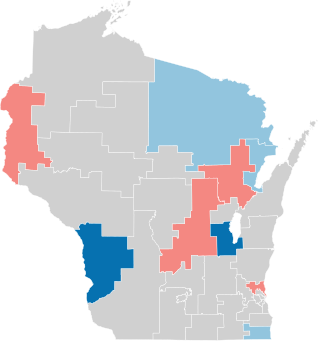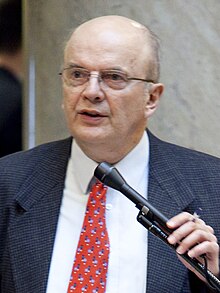
Scott Kevin Walker is an American politician who served as the 45th governor of Wisconsin from 2011 to 2019. A member of the Republican Party, he previously served as Milwaukee County executive from 2002 to 2010.

Peter William Barca is an American Democratic politician from Kenosha, Wisconsin. He was the 14th secretary of the Wisconsin Department of Revenue (2019–2024) in the administration of Governor Tony Evers. He was a candidate for U.S. House of Representatives in Wisconsin's 1st congressional district in 2024 losing to incumbent Bryan Steil; he previously represented the district during the 103rd Congress (1993–1995).

Lena C. Taylor is an American lawyer, judge, and former politician serving as a Wisconsin circuit court judge in Milwaukee County, since January 2024. She previously served 19 years as a Democratic member of the Wisconsin Senate, representing the 4th State Senate district from 2005 to 2024, and was a member of the Wisconsin State Assembly for one term before that.

Henry Carl Schadeberg was an American protestant minister and Republican politician from southeast Wisconsin. He was a member of the U.S. House of Representatives for four terms, representing Wisconsin's 1st congressional district from 1961 to 1965, and from 1967 to 1971. Schadeberg was an unabashed conservative and a strident anti-communist.

John W. Lehman is an American educator and politician from Racine, Wisconsin. Lehman represented the 21st District in the Wisconsin Senate from 2007 to 2011 and again from 2012 to 2015, and was the Democratic nominee for Lieutenant Governor of Wisconsin in 2014. Previously, Lehman was a member of the Wisconsin State Assembly from 1997 through 2007. Elected as a state senator in 2006 but unseated in 2010, Lehman retook his old seat in the 2012 Wisconsin recall elections, defeating the incumbent, Van Wanggaard, who won the seat back in the 2014 general election.

John Martin Antaramian is an American businessman and Democratic politician from Kenosha, Wisconsin. He is the current mayor of Kenosha, serving since 2016, but has announced he will leave office in 2024. He has served a total of 24 years as mayor, having previously served from 1992 to 2008. He also represented Kenosha for 10 years in the Wisconsin State Assembly, from 1983 to 1993.
Timothy Francis Cullen was an American Democratic politician from Janesville, Wisconsin. He was the majority leader of the Wisconsin Senate from 1982 to 1987; he served a total of 16 years in the state Senate, representing Wisconsin's 15th Senate district from 1975 to 1987, then again from 2011 to 2015. He also served two years as secretary of the Wisconsin Department of Health and Social Services (1987–1988) in the administration of Republican governor Tommy Thompson. After leaving public office, Cullen was chair of Common Cause Wisconsin, a nonpartisan good government advocacy organization, from 2016 to 2022. Earlier in his career, he served on the Janesville City Council and the board of the Janesville Public School District.

The Ninety-Sixth Wisconsin Legislature convened from January 6, 2003, to January 3, 2005, in regular session, and held a concurrent special session from January 30, 2003, to February 20, 2003. They also held seven extraordinary sessions during the term.

The One-Hundredth Wisconsin Legislature convened from January 3, 2011, through January 7, 2013, in regular session, though it adjourned for legislative activity on May 22, 2012. The legislature also held two special sessions and an extraordinary session during this legislative term.
Van H. Wanggaard is a Republican politician and former law enforcement officer. He is a member of the Wisconsin State Senate, representing Racine and Kenosha counties since January 5, 2015. He was previously elected to the same office in 2010, but was removed by recall election in June 2012.
Christopher Lee Kapenga is an American businessman and Republican politician from Waukesha County, Wisconsin. He is the president of the Wisconsin Senate, since 2021, and has served in the state Senate since 2015, representing Wisconsin's 33rd Senate district. He previously served two and a half terms in the Wisconsin State Assembly.

Recall elections for nine Wisconsin state senators were held during the summer of 2011; one was held on July 19, and six on August 9, with two more held on August 16. Voters attempted to put 16 state senators up for recall, eight Democrats and eight Republicans, because of the budget bill proposed by Governor Scott Walker and circumstances surrounding it. Republicans targeted Democrats for leaving the state for three weeks to prevent the bill from receiving a vote, while Democrats targeted Republicans for voting to significantly limit public employee collective bargaining. Scholars could cite only three times in American history when more than one state legislator has been recalled at roughly the same time over the same issue.
Joseph A. Strohl is a Wisconsin lobbyist and former Majority Leader of the Wisconsin State Senate. He represented Racine County as a Democrat from 1979 through 1991.
The 21st Senate district of Wisconsin is one of 33 districts in the Wisconsin Senate. Located in southeastern Wisconsin, the district comprises northeast Racine County and southwest Milwaukee County. It includes the city of Franklin, the northern half of the city of Racine, the western half of the city of Greenfield, and part of southwest Milwaukee, as well as the villages of Greendale, Hales Corners, Caledonia, Wind Point, and North Bay.
The 22nd Senate district of Wisconsin is one of 33 districts in the Wisconsin Senate. Located in southeast Wisconsin, the district comprises parts of eastern Kenosha County and southeast Racine County, including most of the city of Kenosha and the south side of the city of Racine, along with the villages of Somers and Sturtevant, most of the village of Mount Pleasant, and the northern half of the village of Pleasant Prairie. The district also contains Kenosha Regional Airport, Johnson Wax Headquarters, the Foxconn in Wisconsin industrial park, Regency Mall, Carthage College, and the University of Wisconsin–Parkside campus.

Recall elections for four Wisconsin state senators were held during the spring of 2012. Voters put four state senators up for recall, all Republicans, because of the budget repair bill proposed by Governor Scott Walker and circumstances surrounding it. Democrats targeted Republicans for voting to significantly limit public employee collective bargaining. Scholars could cite only four times in American history when more than one state legislator has been recalled at roughly the same time over the same issue. The recall elections occurred on June 5, with May 8 being the date of the primary election.

The 2014 Wisconsin gubernatorial election took place on November 4, 2014, to determine the governor and lieutenant governor of the U.S. state of Wisconsin. It occurred concurrently with elections to the United States Senate in other states and elections to the United States House of Representatives and various state and local elections.
A recall election in the state of Wisconsin is a procedure by which voters can remove an elected official from office through a direct vote before his or her term has ended.

The 2018 United States House of Representatives elections in Wisconsin were held on November 6, 2018, to elect the eight U.S. representatives from the state of Wisconsin, one from each of the state's eight congressional districts. The elections coincided with other elections to the House of Representatives, elections to the United States Senate, and various state and local elections. The Wisconsin Partisan Primary was held on August 14, 2018, with the governor, U.S. Senator, U.S. Representative, odd-numbered Wisconsin State Senate seats, and all Wisconsin Assembly seats on the ballot.

The 1996 Wisconsin Senate election were held on Tuesday, November 5, 1996. Sixteen of the 33 seats in the Wisconsin Senate were up for election—the even-numbered districts. At the time, Democrats held 17 seats while the Republicans held 16, having lost their majority only months prior due to the recalling of Senator George Petak.













